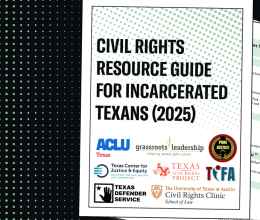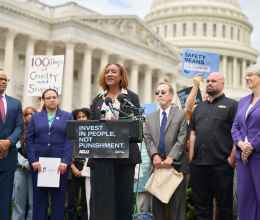
BY ELIZABETH PIERSON The Brownsville Herald
March 19, 2006 - AUSTIN - The last of six boys sitting comfortably, if nervously, with his back against the painted cement hallway wall is round-faced and big-eyed on this first morning away from his South Texas home.
His knobby knees covered by orange scrubs, he looks younger than his 12 years. His voice is still high, and the childish way he fumbles with the Velcro on his bright white tennis shoes makes it easier to imagine him in elementary school gym class than here at the Central Texas processing unit of the Texas Youth Commission.
A few hours earlier, he arrived in a sheriff's car, and the state became his guardian. A judge sent him to TYC for at least two years for sexually assaulting a neighbor girl half his age. Like many of the 4,000 children and young adults in TYC, he represents a curious intersection of childhood innocence and horrid crime.
He refastens the straps on his shoes and excitedly asks an administrator a question that seems more childlike than sexual predator: "Do we get to keep the shoes?"
The goal in sending him and 2,500 other offenders to Texas juvenile prisons each year is to guide them toward reform, but increasingly, the offenders are themselves becoming victims.
Rates of physical abuse in TYC have increased steadily for at least seven years. By 2005, three of every 100 detainees were abused by the employees who watch over them. The most drastic increase came in 2004 when the abuse rate more than doubled from the previous year. The number of cases jumped from 56 to 120, even though the incarcerated population grew by less than 3 percent.
Most abusers were juvenile correctional officers, or JCOs, the unarmed direct-care workers who watch over inmates as they eat, sleep, study, detoxify from drugs and alcohol and deal with the demons of their young lives.
"It (abuse) is a critical issue for us," said Ray Worsham, chief inspector general for TYC. "We've seen this increase coming and been trying to deal with it as it comes along."
The findings include records from the 389 cases between Jan. 1, 1999, and Sept. 30, 2005, in which TYC investigators confirmed that employees had physically abused the children and young adults. They do not include cases of neglect, sexual abuse, emotional abuse or unconfirmed allegations.
Officers have punched, kicked, choked, slapped and bitten young inmates, records show. They threw them against walls, cement floors and tables as a means of restraint - all violations of the agency's use-of-force policies that allow restraints only when the inmates are physically threatening themselves or another person. Even then, force should be the minimum amount necessary.
In one case in May 2005 at Crockett State School in East Texas, officers fractured a student's arm by piling on top of him.
The student was issued pants that were too big and refused to return them. An officer tried to restrain him by falling on top of him but instead knocked the boy off his bunk and onto the floor. The boy escaped and ran to a nearby table, where one officer brought him to the floor, and another one piled on top of them.
X-rays at the hospital confirmed the fracture. Each officer received 90 days probation and additional training in restraint techniques.
Employees say the abuse numbers tell only half the story of increased violence in juvenile prisons, one in which caretakers are the victims. In 2005, TYC employees filed 773 workers' compensation claims for aggression-related injuries, a 70 percent increase from 2000.
"We see there's a building crisis there," said Mike Gross, vice president of the Texas State Employees Union. "We hear problems with guards getting hurt by kids bigger, tougher than them."
Many cases occur after a youth has verbally provoked an employee or refused to comply with a rule, but not made physical advances. Abuse happens often after youth are in handcuffs or while employees try to restraint them, records show.
One investigation found that on March 10, 2005, at San Saba State School in rural Central Texas, a youth who was hand-cuffed and standing against a wall threatened to assault his peers and called a male officer a "ho."
The officer took him into a cell, out of view of staff and cameras and shoved him at least twice into the wall. The boy said the officer stabbed him in the upper gut with a pen and threatened to "snap his neck" if he told anyone what had happened.
The youth suffered bruising and a sore jaw, according to the report. The officer received a written reprimand.
Two months later, the same officer was fired after he raised a boy's handcuffed arms high above his head, took him away from the security camera's view, threw him to the ground, pinched his nipples and forced him to lie naked on the floor of his cell.
Most cases involve first-time abusers, and their punishment range from written reprimands to termination. They were fired in 23 percent of nearly 400 cases and resigned while they were still under investigation 17 percent of the time. Other cases were still pending discipline when records were requested in late 2005.
Hard to keep them
Turnover and inadequate training are major contributors to the increasing abuse, said Dwight Harris, executive director of TYC.
Last year, 90 percent of officers left before they reached six months on the job.
Harris said two weeks of training didn't prepare some well enough to handle a dorm with as many as 18 delinquent students. Others learned quickly their personalities weren't cut out for the work, or they left for better-paying jobs. Some were fired for abuse.
When new hires quit, the remaining officers are left on at understaffed dorms to cover shifts, often without overtime pay. Their frustration builds, and they become more likely to make mistakes or commit abuse, Harris said.
Harris describes a "vicious cycle:" To keep officers, the agency must offer more training. To offer more training, the agency needs more officers to cover the dorms.
"We're not talking about bad people here that wake up in the morning and say, 'I'm going to go to work, and I'm going to abuse a kid,'" Harris said. "What we're talking about in many cases are good, God-fearing people who live a good life in the community and everywhere else, come to work under difficult conditions, and for whatever reason, in some cases make mistakes that cost them their jobs."
At the end of February, nearly 17 percent of the 2,600 juvenile correctional officer positions were empty.
In his 24 years with the agency, including time as a caseworker and an investigator of abuse, he has grown to understand that officers are often asked to perform at a level higher than their skills allow.
Yet all a person needs to get a job as juvenile correctional officer is an 18th birthday, a driving record with fewer than 10 points and a high school diploma. Better pay would help recruit and retain more qualified officers, Harris said.
Annual salaries for juvenile correctional officers start at under $22,000, but most officers make more than the minimum. On average, they have four years of experience, which qualifies them for a $30,000 salary. After eight years, they can make $32,300.
Not just one facility
By the time a rash of abuses occurred at the Evins Regional Juvenile Center in late 2004, the agency had seen an increase in abuses for a year.
In November 2004, guards from a TYC task force who had been sent to Evins to quash riots there also committed abuses over a period of several days. Eight cases were confirmed that month alone, more than the previous four years combined.
Eight officers abused youth, investigators confirmed. Four were fired, one received a written reprimand, and three appealed and had their cases overturned.
The abuse left children injured, it hurt morale, sparked lawsuits and terrified parents.
Guadalupe Briseño Jr. remembers a nervous drive with his wife from their home in Corpus Christi to Edinburg the day after guards there injured his son, then 17-year-old Guadalupe Omar Briseño.
TYC records show his mother reported the boy had been choked, hit in the ribs, placed in restraints and left on the ground for four hours outdoors. Eight witnesses said they saw an officer grab Briseño by the throat and slam him back-wards after he squinted at the officer. Briseño's glasses had been broken in the incident, and he could not see.
He suffered bruises and scratches in the ordeal, his father said. The officer was later fired, but the incident left the family shaken, especially when their son told them an administrator stood by laughing while it happened.
"What my wife and I knew was they liked my son. They called for him. He asked questions," Briseño said. "And then when this happened, man I tell you what, we went crazy."
His son finished his sentence for aggravated assault about a year ago. He is now 19 years old, goes to school full time and works at a Corpus Christi department store. The family decided not to file a lawsuit against the agency. Others did.
TYC officials cite the Evins incidents as one reason for the agencywide increase in the rate of physical abuse in 2004. Youth riots and a change of leadership at Victory Field Correctional Academy in North Texas also contributed to the sharp rise, they said.
But abuse rose system-wide, with 11 of the 13 large facilities experiencing significant increases in 2004.
The nine halfway houses remained nearly clear of physical abuses from 1999 to 2005, records show. The only two confirmed cases happened in 2004.
Employees, students or their parents can file allegations of abuse. Agency policy requires the allegations be investigated by an inspector general who works at each of the 13 high-security sites but reports directly to TYC administrators in Austin. For every five allegations made, one is confirmed.
Last year, the most abusive detention center was the gateway to the TYC system: the Marlin Orientation/Assessment Unit, near Waco. There, a night supervisor kicked, punched, dragged and shoved detainees repeatedly, sometimes moving them out of view of security cameras before abusing them, records show. Subordinates covered for him, and at times, joined in.
Harris points out that the facilities with the most abuse cases often had the highest levels of turnover. Marlin is an exception.
He and other agency executives monitor abuse trends closely and work with superintendents to develop detailed plans for improvement when problems arise, Harris said.
Little boys, big crimes
Most youth in trouble with the law never see the inside of a TYC facility, but work through their local probation departments. Those sent to TYC represent 3 percent of youth that enter the criminal justice system.
One-third are violent offenders. The most common crimes are burglary, drug offenses, simple assault, unlawful use of a motor vehicle, sexual assault and aggravated assault.
They are as young as 10 and can stay until they are 21 years old. The vast majority are between 15 and 17 when they are committed.
Juvenile correctional officers have a particular responsibility to help youth because they spend most hours with them, said Priscilla Guajardo, general counsel for Southwest Key, a youth advocacy group based in Austin and an organizer with the Texas Coalition Advocating Justice for Juveniles. The latter group has been critical of TYC for what they see as unnecessary lengthening of sentences, overrepresentation of minorities in detention and abuse.
"These are kids who have had failed relationships already," Guajardo said. "I think it's important to establish that there can be positive influences in their lives, individuals who want to work with them and care about their success and want to see them reach their potential."
TYC officials said the agency has been successful despite rising abuse levels. Its capital offender program is looked to as a model by programs around the world.
And more than half of TYC youth avoid rearrest for at least three years after they leave, a success considering most have already broken the law more than once in their local probation programs before they are ever sent to TYC, said spokesman Tim Savoy.
If abuse numbers are high, it could be in part because TYC is more vigilant about reporting abuse than similar agencies nationwide, said Neil Nichols, TYC general counsel and 32-year veteran of the agency.
Nichols saw TYC through a massive reorganization in the 1970s that gave children due process rights in juvenile courts, outlawed corporal punishment at TYC and established halfway houses. The changes were prompted by a U.S. Supreme Court ruling ordering reform, and youth correctional agencies around the country followed suit.
"It's significant, and we take it very seriously," Nichols said of the recent rise in abuse cases. "We know that the trend is what it is, and probably you won't find any other correctional agency in the nation that tends to it like we do."
Recent changes
In 2003, the TYC board approved rule changes that for the first time required inspector generals at each facility to report directly to Austin, rather than their respective superintendents. They also required that investigators look into any report that might involve abuse, not just those reported as abuse.
"I still think that the policy change has something to do with it," said board Chairman Pete C. Alfaro of the increase abuse rates. "It's not the only reason, but it contributes some to it."
TYC administrators said they couldn't say with certainty that the changes contributed to the increases in abuse. In interviews and written responses, they repeatedly referred to the problems of high turnover and insufficient training as major reasons for the increases.
Guajardo of Southwest Key said she wants to see allegations of abuse investigated by someone outside of system, either another state agency or law enforcement. The current system of internal investigators presents inherent conflicts of interest, she said.
Juan Sanchez, chairman of the TCAJJ coalition, which has been critical of the agency's abuse rate and policies, blamed Harris' leadership for the increase. Harris was named executive director in 2004.
"I can't believe that a state agency that hires, supposedly, and trains professional men and women to deal with kids who have problems cannot develop a system and a treatment program that manages kids' behavior, addresses their attitude and really helps provide good treatment for them," Sanchez said.
Sanchez is also president of the board of directors for Southwest Key, which last year lost a contract with TYC for a community-based offender program in Houston after the agency was directed by the Legislature to use more of its existing space before sending children to contract care.
He insists his criticism of the agency is not based on losing the contract, but rather a fundamental disagreement about the direction TYC is taking. They built more beds in the mid-90s and now feel compelled to fill them by extending sentences and taking youth out of community programs, both of which stall progress of the young people, he said.
And, nearly every day, they keep coming.
The boy who just put on his perfectly white shoes doesn't know what awaits him at TYC. He'll be able to keep the shoes on his feet when he leaves, but they will likely be a bigger size since he will have grown into a teenager behind the high fences.
On this morning, he had five hours to contemplate his pending imprisonment as cow pastures and cotton fields zipped past him outside the window of the sheriff's car.
"I kept sayin' to myself, 'I hope I make it. I hope I make it,'" he said. "That's what I just kept sayin' to myself."
Posted on Mar 19, 06 | 12:00 am






